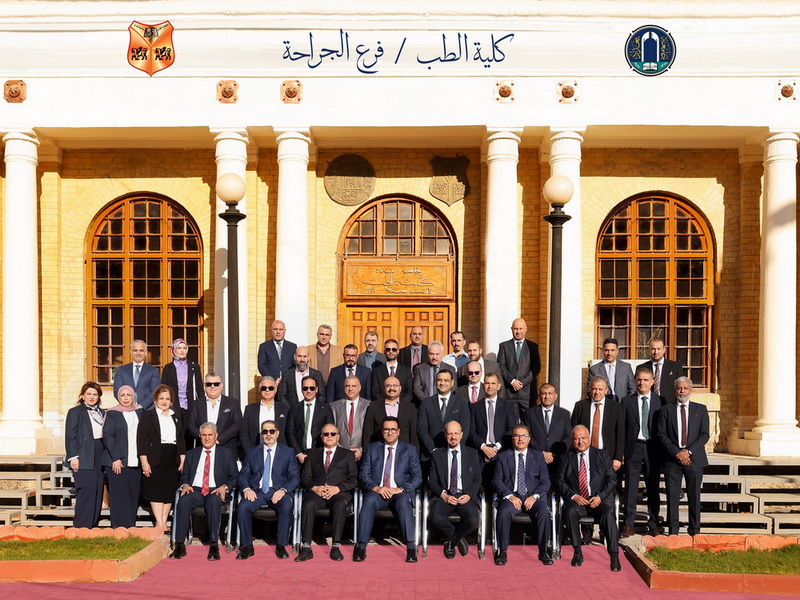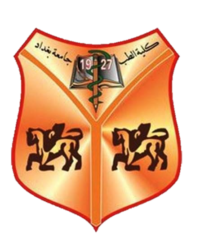
The department was officially established in “1935”, and doctor Ibraham was the first department chair, followed by Dr.Morgan in “1944-1945”, Dr.Harper in “1945-1950”, Dr.Whordle in “1950-1955”, then Dr.Saab Shawkat assumed responsibilities as chairman. It’s been held by Iraqi elite doctors ever since. At the moment, the surgical department is chaired by Dr.Tariq Ibrahim Yaqoob, and is considered one of the biggest departments in College of Medicine/University of Baghdad, with a variety of specialties, including :
- General Surgery
- Urology
- Cardiothoracic and Vascular Surgery
- Orthopedic Surgery
- Pediatric Surgery
- ENT Surgery
- Ophthalmology
- Neurological Surgery
- Plastic and Reconstructive Surgery
- Anesthesiology
- Diagnostic Radiology
- Therapeutic Radiology
3rd Grade
Regarding 3rd grade, surgical materials are limited to the theoretical lectures only, after which students are expected to sit a midterm exam (40%), then a final exam (60%).
4th Grade
As for the 4th grade, theoretical lectures are given then quizzes are conducted at the end of each lecture, including general surgery, urology, cardiothoracic and vascular surgery, pediatric surgery, diagnostic radiology, therapeutic radiology, plastic and reconstructive surgery, and anesthesiology. As well as a training extending throughout the year in the surgical wards according to the terms, divided into (2 terms per year). Each of which consist of 14 educational week where by faculty members train students , and students’ contribution and participation in discussions are encouraged rather than being passive recipient, and students are expected to adhere to the schedule and time from 10am- 1pm. During the training phase in the surgical wards, all the materials to be given are the same in each ward, and the individuals responsible for each ward are expected to carry out such duties of organization. Additionally, students are already pre-given the entire itinerary from the beginning of the year in orientation.
The distribution includes tutorials are given in the wards with discussions, and by the end of the term students are assessed as indicated; (20%) for clinical part, (30%) midterm, and finals are given (50%).
5th Grade
5th grade students follow the same schedule as the 4th grade, the material includes, orthopedic surgery, ophthalmology, ENT surgery, neurological surgery, throughout the year. Students are then trained in the out-patient-clinics for each specialty for 3h per day running through the week. Whereby 2 groups are sent to each unit for 2 weeks and they’ll be assessed by the end of the term accordingly; (30%) cumulative, finals (70%). The faculty members are instructed to attend and follow up on students training through their out-patient-clinics practice.
6th Grade
As for 6th grade, their teaching and training is purely clinical in the surgical wards. Whereby they’re divided into 8 groups training in the general surgery wards for 8 weeks. 2 groups for each urology and orthopedics for 2 weeks throughout the year.
During this timeframe students are assigned to patients by seniors in each ward, and students are expected to follow up with their assigned patients throughout their training on their conditions, as well as filling case sheets. Also tutorials are assigned for each student to discuss with an assigned faculty member. By the end of the term, students are assessed as following; (20%) cumulative, (40%) clinical exam, and finals (40%), noting that no midterm exam for this grade.
Department of Surgery Schedule
Theoretical Part
- 6th Grade Students: 0 hours per week
- 5th Grade Students: 10 hours per week
- 4th Grade Students: 8 hours per week
- 3rd Grade Students: 1 hour per week
Practical Part
-
6th Grade Students:
- General Surgery: 5 hours per day / 25 hours per week
- Urology: 5 hours per day / 25 hours per week
- Orthopedic Surgery: 5 hours per day / 25 hours per week
-
5th Grade Students:
- Orthopedic Surgery: 3 hours per day / 15 hours per week
- Ophthalmology: 3 hours per day / 15 hours per week
- ENT Surgery: 3 hours per day / 15 hours per week
- Neurological Surgery: 3 hours per day / 15 hours per week
- 4th Grade Students: 3 hours per day / 15 hours per week
- 3rd Grade Students: 4 hours per day / 20 hours per week
Lecture Modules
- 5th Grade Students
- Orthopedic Surgery / 5 lectures per week / Orthopedic Module
- Ophthalmology / 2 lectures per week / ophthalmology Module
- ENT Surgery / 2 lectures per week / ENT Module
- Neurological Surgery / 1 lecture per week / Neurological Surgery Module
- 4th Grade Students / 100 lecture per year, repeated twice / Surgical Module
- 3rd Grade Students / Lectures included within the Infectious & Nutrition Module
- 6th Grade Students
- Clinical surgery is taught throughout the year in the following specialties :
- General Surgery
- Urology
- Orthopedic Surgery
- 5th Grade Students
- Clinical surgery is taught throughout the year in the following specialties :
- Orthopedic Surgery
- Ophthalmology
- ENT Surgery
- Neurological Surgery
- 4th Grade Students
- Clinical surgery is taught throughout the year in the following specialties :
- General Surgery
- Urology
- Cardiothoracic & Vascular Surgery
- Pediatric Surgery
- Diagnostic Radiology
- Therapeutic Radiology
- Plastic and reconstructive Surgery
Furthermore, surgical department faculty not only limited to undergraduate teaching and training, but their duties extend to teaching, training and mentoring many higher education students pertaining to College of Medicine/University of Baghdad.
Additionally, the department of surgery is directly responsible for the followings :
- Post-graduate degree in therapeutic radiology
- Post-graduate degree in anesthesiology
- Post-graduate degree in diagnostic radiology
Academic Staff – Department of Surgery
For a comprehensive and automatically updated list of surgery department faculty members, please visit the University of Baghdad Surgery Repository .

